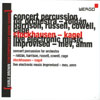Earle Brown - A Life in Music Vol. 1
A welcome reissue for a series of recordings by a new-music pioneer
View record and artist detailsRecord and Artist Details
Composer or Director: John Cage, Karlheinz Stockhausen, Amadeo Roldán, William (Billy) Russell, Anonymous, Lou Harrison, Mauricio Kagel, Henry (Dixon) Cowell
Genre:
Orchestral
Label: Earle Brown Contemporary Sound Series
Magazine Review Date: 3/2010
Media Format: CD or Download
Media Runtime: 0
Mastering:
Stereo
ADD
Catalogue Number: WER6928-2

Tracks:
| Composition | Artist Credit |
|---|---|
| Ritmica V |
Amadeo Roldán, Composer
Amadeo Roldán, Composer Various Artists |
| Ritmica VI |
Amadeo Roldán, Composer
Amadeo Roldán, Composer Various Artists |
| Canticle No. 1 |
Lou Harrison, Composer
Lou Harrison, Composer Various Artists |
| (3) Dance Movements |
William (Billy) Russell, Composer
Various Artists William (Billy) Russell, Composer |
| (3) Cuban Pieces |
William (Billy) Russell, Composer
Various Artists William (Billy) Russell, Composer |
| Ostinato pianissimo |
Henry (Dixon) Cowell, Composer
Henry (Dixon) Cowell, Composer Various Artists |
| Double Music |
John Cage, Composer
John Cage, Composer Various Artists |
| Amores |
John Cage, Composer
John Cage, Composer Various Artists |
| Zyklus |
Karlheinz Stockhausen, Composer
Karlheinz Stockhausen, Composer Various Artists |
| Refrain |
Karlheinz Stockhausen, Composer
Karlheinz Stockhausen, Composer Various Artists |
| Transicón II |
Mauricio Kagel, Composer
Mauricio Kagel, Composer Various Artists |
| Improvisations |
Anonymous, Composer
Anonymous, Composer Various Artists |
Author: Philip_Clark
Unlike their jazz and rock colleagues, classical composers can be peculiarly cavalier about recording. I don’t mean about having CDs out – every composer wants their shiny circular love-object – but about the recording process itself: I’ve written a great piece, but how best to represent its intricacies on disc?
Earle Brown, the American composer usually bracketed with New York School associates such as John Cage and Morton Feldman, was an honourable exception. During the 1950s Brown was a recording engineer at Capitol Records, charged with making artists like Count Basie and Ray Charles sound great. Then, between 1961 and 1973, he devised and produced 18 LPs released under the moniker “Contemporary Sound Series” that cracked into the new-music zeitgeist: Stockhausen, Kagel, Berio, Bussotti, Cage and Feldman from the European and American avant-gardes rubbed shoulders with free improvisation and the proto-minimalism of Alvin Lucier and David Behrman. Brown also embraced then niche figures such as Xenakis and Aldo Clementi – a striking vote of faith in the vitality of new music.
Or make that new musics. Brown’s series finds wanting the perceived wisdom that post-war music was only about unfeeling, post-serial mathematical dross. Not that these pioneering records have been easy to judge – for 40 years they have languished in vinyl-only limbo – but now Wergo will reissue the complete series over six digitised three-CD sets, a project planned for completion in autumn 2011.
Although the opening disc of this first instalment – “Concert Percussion for Orchestra”, a mix of some decent Cage, Lou Harrison and Henry Cowell compositions against hopeless period-piece duds – is underwhelming, in his second project Brown hit his stride. In ’61, when he released it, Stockhausen’s Zyklus and Refrain and Kagel’s Transición II were essentially unknown outside Germany. Today Refrain sounds puny and hubristic, as the players simultaneously declaim text implying cryptic meanings which Stockhausen’s ho-hum note patterns fail to elaborate. Kagel’s piece flexes far weightier expressive muscle. Randomly ordered pages and recorded fragments of the unfolding instrumental argument, harnessed in real time, are dropped back into the emerging montage; order is usurped by the transcendent unknown.
It’s apt that disc 3 should feature music by landmark free-improv collectives AMM and Musica Elettronica Viva. It was Cornelius Cardew, once his assistant, who first blew the whistle on Stockhausen’s controlling tendencies. He returned to London and joined AMM, an ensemble in which each player aimed to submerge their instrumental allegiance and ego inside a centring flow of sound. Even when the occasional untreated piano or cello sound scrambles to the surface from out of the multi-strata of activity, it only emphasises the validity of the basic concept. These tactile, autonomous sounds emerge from inside your own body it seems, making so much music feel domesticated and boxed-in.
Explore the world’s largest classical music catalogue on Apple Music Classical.
Included with an Apple Music subscription. Download now.

Gramophone Digital Club
- Digital Edition
- Digital Archive
- Reviews Database
- Events & Offers
From £9.20 / month
Subscribe
Gramophone Club
- Print Edition
- Digital Edition
- Digital Archive
- Reviews Database
- Events & Offers
From £11.45 / month
Subscribe
If you are a library, university or other organisation that would be interested in an institutional subscription to Gramophone please click here for further information.






